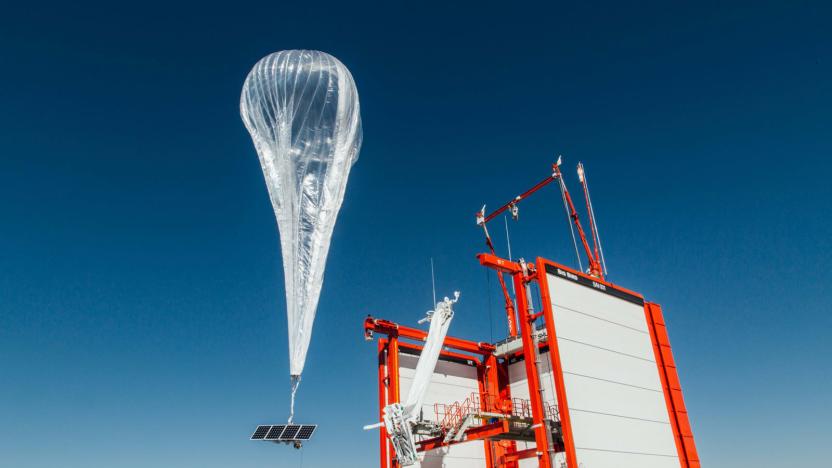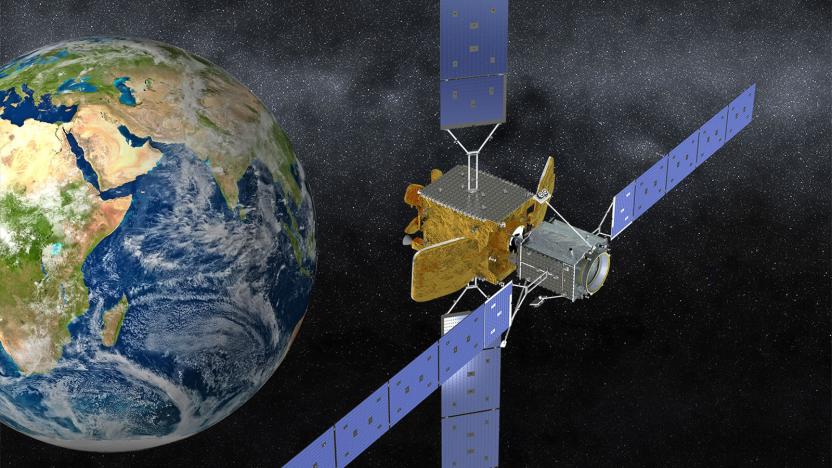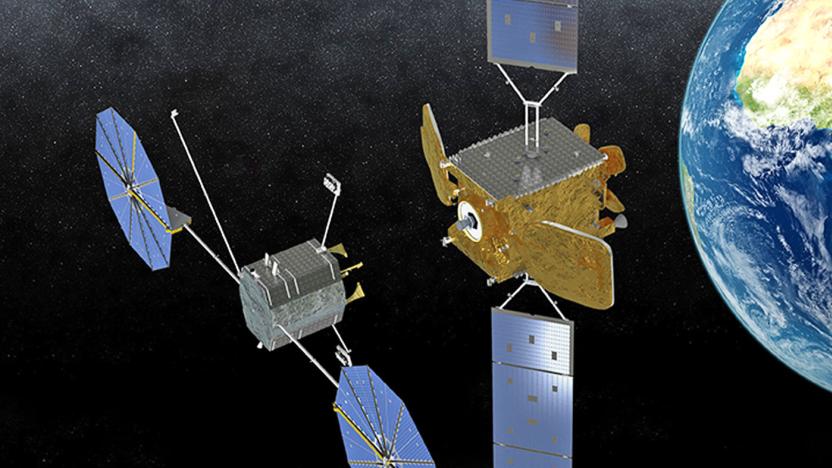Intelsat
Latest

Intelsat's Boeing-made satellite explodes and breaks up in orbit
An Intelsat communication satellite built by Boeing has exploded and broken up in geostationary orbit.
Steve Dent10.23.2024
Amazon's latest stunt is beaming a new Prime Video sci-fi show into outer space
'Night Sky' was the subject of 'the first-ever intergalactic premiere.'
Kris Holt05.20.2022
Gogo in-flight internet has been renamed Intelsat
Consider the old name go-go-gone.
Jessica Conditt07.13.2021
Alphabet's Loon, telecoms unite to boost high-altitude internet
Alphabet's Loon just got a big boost from telecoms in its bid to provide high-altitude internet to the world. The company has partnered with several industry giants to form the HAPS Alliance, a group devoted to promoting the use of stratospheric vehicles for internet access. Most of the allies are telecoms like Deutsche Telekom, SoftBank, Bharti Airtel, China Telecom and Telefonica, although the group also includes a diverse range of equipment makers like Airbus, AeroVironment, Ericsson, Intelsat and Nokia.
Jon Fingas02.22.2020
Northrop's satellite life extension spacecraft launches on October 9th (updated)
Space junk is hard to completely avoid when satellites can only last so long, but that might not be a problem for much longer. Northrop Grumman and NASA are launching a "first-of-its-kind" service vessel, the Mission Extension Vehicle, aboard a Russian rocket on October 9th. The inaugural MEV-1 will dock with an Intelsat satellite in three months' time and provide life-extending services over five years. After that, it should be free to help other satellites -- it'll still have 10 years' worth of use after that.
Jon Fingas10.06.2019
ViviSat has a plan to breathe new life into aging satellites
The wealth of space junk idling around Earth is becoming such a serious problem we've taken to dreaming up supervillain schemes to address it. No one solution has been settled on quite yet, but in the meantime ViviSat -- a joint venture between aerospace firms US Space and Orbital ATK (formerly Orbital Sciences) -- has an idea that should cut down the amount we're adding to the dumpster in the sky. Satellites have a lifespan defined by how much fuel they carry into orbit, but with the help of ViviSat's Mission Extender Vehicle (MEV), they could survive up to 15 years longer than they were originally destined to.
Jamie Rigg03.09.2016
SpaceX and Intelsat announce first commercial contract for Falcon Heavy rocket
SpaceX hit one pretty big milestone recently -- to put it mildly -- and it's now already back with another fairly significant one. It's announced today that satellite service provider Intelsat has signed the first commercial contract for its Falcon Heavy rocket, which is currently slated to undertake its first launch sometime in 2013. Details on the contract itself remain decidedly light at the moment, but SpaceX will apparently be launching at least one Intelsat satellite into geosynchronous transfer orbit (or GTO) sometime after it's completed its launch tests, and Intelsat says it'll be working closely with SpaceX in the lead up to the launch to ensure that the rocket meets its standards. You can find the official announcement after the break.
Donald Melanson05.29.2012
'Zombie satellite' springs back to life, actual zombies still zombies
In the George A. Romero classic, Night of the Living Dead, a radioactive satellite falls to earth and causes the dead to rise from their graves -- but what if the satellite itself had become a zombie? That's the slightly less frightening reality that has befallen Intelsat's Galaxy 15 communications satellite, which "went rogue" in April of 2010 and has been unresponsive ever since -- even though it has continued to transmit signals. Late last month, however, the satellite finally came back to life, and Intelsat was able to put it into safe mode to prevent it from interfering with other communications satellites. It's apparently even now trying to determine if the satellite could become fully functional again -- although, if you ask us, that just sounds like it's all part of the zombie satellite's plan...
Donald Melanson01.03.2011
Cisco successfully tests orbital IP router, Pirate Bay 'very interested'
It's been almost three years since Cisco and the DoD announced the IRIS project. Short for Internet Routing in Space, the idea is to route IP traffic between satellites instead of bouncing it on and off ground stations. The whole thing has moved forward steadily since we first caught wind of it, culminating with the launch of the first Cisco Space Router aboard an Atlas V rocket last November. According to The Register, the company has just finished its first in-orbit test of the thing, and -- lo' and behold -- it's a success! After some more testing by the DoD (which will go down between now and April), Cisco plans on running yet more trials. And after that? With any luck, IRIS will extend "constant and pervasive" Internet access to areas not served by traditional ground or 3G networks. And never again will a single person have to live their life without having seen the Bill O'Reilly "F**k It, We'll Do It Live!" rant.
Joseph L. Flatley01.21.2010
International HD news roundup
Here at Engadget HD, we'd prefer not to just focus on high-def happenings in the US of A. Thus, we round up the best of the best from the international front each week and present it here, bundled together in a single, easy to digest list. If something went down in your corner of the globe over the past seven days, let the rest of the world know it in comments. 'Til next week, até à próxima!Read - Sky HD EPG relaunched Read - Fox Pan American Sports Establishes Its First HD Platform on the Intelsat Network Read - Portugal goes for Zen Read - Movies debut on German iTunes store
Richard Lawler04.19.2009
Intelsat retires Marisat-F2 satellite after 32 years of service
The Marisat-F2 satellite may not have garnered quite the fame of other mission-defying spacefarers like the Mars Opportunity rover (it even seems to have been a bit camera shy), but it's earned it's own little place in the history books nonetheless, with it stretching its original five-year design life to a hefty 32 years of service. That apparently made it the oldest commercial communications satellite still actively operating in space but, sadly, that streak has now come to an end, with Intelsat announcing that it has decommissioned the satellite and is using its remaining bit of fuel to raise it to "disposal altitude" in order to keep it out of the way of other satellites. Originally built by Hughes Aircraft in 1976, the 700-pound satellite had been primarily serving ships at sea and scientists at the South Pole, who were using it for internet access in more recent years, since it had actually proven to be more capable than the two other more recent satellites serving the area.
Donald Melanson11.03.2008
DirecTV, DISH sign up for Clearwire
Just as many analysts predicted following the two companies' failure to secure any spectrum during last year's FCC auction, both DirecTV and DISH-parent EchoStar have signed agreements with Craig McCaw's Clearwire to provide qualifying customers with high-speed wireless internet service (and by qualifying customers, we mean anyone who lives within a Clearwire coverage zone). What's more, current Clearwire subscribers will have the opportunity to sign up for satellite TV delivered right to their modems -- an American first, as far as we know. In other industry news, the Wall Street Journal is reporting that EchoStar and future DirecTV-owner Liberty Media are planning a multi-billion dollar bid for satellite-communications provider Intelsat, which would provide both firms with additional capacity and/or the capability to offer broadband from the heavens. So far all we know regarding a launch window for the Clearwire deal is that bundled packages will be available from all three parties later this year, once again making your satellite vs. cable decision a difficult one.Update: D'oh! As several of you have noted, it's entirely possible -- nay, likely -- that Clearwire will simply be offering traditional satellite TV as part of a services bundle, rather than sending DirecTV / DISH content over its network.Read - ClearwireRead - Intelsat [Warning: subscription required]
Evan Blass06.14.2007
US military to launch WiFi router into space
The mysterious expanses of space have been seeing quite a lot of action lately, but rather than watching a couple of autonomous crafts tackle tasks for kicks, the US military is hoping to set their next router right beside a constellation. Partnering with Intelsat and Cisco Systems, the US Department of Defense is hoping "to test an internet router in space in hopes of benefiting civilian broadband satellite communications." Additionally, the Internet Routing In Space (IRIS) project aims to assist in all sorts of "military communications," as it routes IP traffic between space-bound sats and cuts down on the time required to divvy out information. As expected, voice, video, and data will all be supported, and once the three-year initiative is complete, "the technology will be available for commercial use" -- you know, in case you're looking to relocated your networking gear to the Black Hole.
Darren Murph04.12.2007